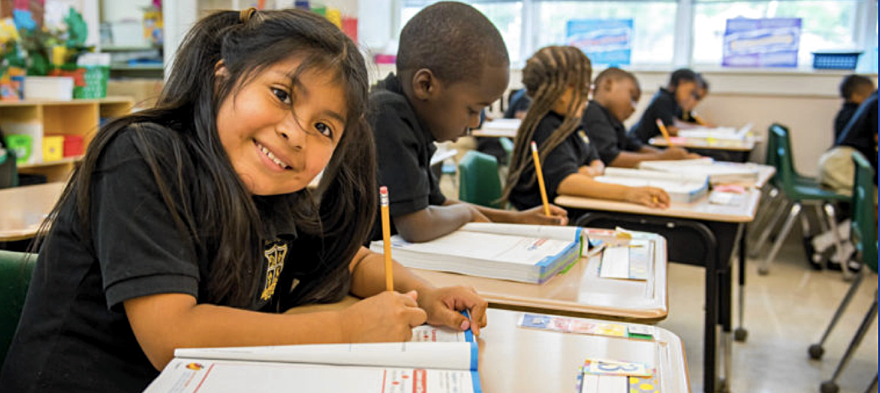
This year, for many children, school was a respite. They could see their friends, whether virtually or in person with precautions. They could ask questions and get answers. They could escape into a book or math problem. And they had access to caring teachers, school staff, nurses and counselors.
But, for some children, all of this was harder to access. In New Orleans, around a third of our students missed at least 10 days of school this year. As a former classroom teacher, I am confident that when this happens, it is not because a child does not care about their education. [pullquote]I believe all students care and want to learn. But, I do know there are students who are discouraged, overwhelmed or facing obstacles beyond their control.[/pullquote]
This year brought new obstacles. While school was virtual, computers crashed and internet connections failed. Students and their families contracted COVID-19 and grieved loved ones. And hurricane season was relentless–families and teachers alike lost power again and again. Surges of the virus opened and closed in-person classes, making it hard for children to get back in the routine of a normal school day.
This has created a crisis. Students need to be in their classes; kindergarten attendance is predictive of reading and math scores in fifth grade. Each day a child misses school is a day they may feel farther behind, and this can create a cycle of feeling unsuccessful and struggling to catch up. It is no surprise that attendance is associated with stronger academic outcomes and higher graduation rates. Dropping out can be devastating for young people, and doing so is associated with lower earnings, worse health outcomes, and an increased risk of incarceration.
These, of course, are systemic issues, and addressing them is on all of us. [pullquote position="right"]Attendance and injustice are inextricably linked.[/pullquote] Poverty impacts attendance; it’s harder to get up for school if you have slept poorly due to stress, hunger or unstable housing. And the pandemic-era barriers of broken laptops and spotty internet were faced by some students more than others. Because of existing healthcare disparities, COVID-19 itself did not have the same impact on all children, either; Black, Latinx and American Indian families were more likely to have the virus.
In New Orleans, our teachers worked hard to engage students despite the circumstances. They did an incredible, innovative job. They taught the basics of Zoom while they taught algebra and poetry. They built relationships with children and families through a screen. With so many students missing days, they moved some students forward academically, while helping others catch up.
They also worked hard to address attendance. They made phone calls home when students did not show up in-person or online, and they rewarded students who did. They looked at patterns and came up with strategies. They looked to the root causes of absences; if a child missed class again and again, they worked with the child and their family to understand why and to meet any unmet needs. They will do the same this summer and fall. Our educators are experts and they are determined to get children back in school.
So are we. At New Schools for New Orleans (NSNO), the organization I lead, we are proud to bolster their efforts. Our $1.5 million summer learning fund supports summer school and enrichment citywide, which will help students catch up academically and feel ready to show up next year. Our instructional quality Initiative makes sure schools have funding and knowledge to use the best curriculum, which keeps class productive and engaging. We are also launching a professional development “hub” to help educators provide trauma-informed environments for their children. This, we hope, will foster schools that feel healing and safe. And our talent team helps schools recruit and retain the strong, experienced educators that children come to school to see.
We believe all this will make a difference. We also expect that, if COVID-19 rates in our community stay low and school can open in-person in the fall, attendance rates will rise. If we invest collectively in both the school and societal-level supports our children deserve, we will see even greater improvement. Our young people have been through so much recently, but next year can and will look different. Together, we can make sure that students are able to learn together in the fall, knowing they are right where they belong.
Patrick Dobard is former superintendent of the Recovery School District and is the CEO of New Schools for New Orleans.
The fight for educational equity has never been just about schools. The real North Star for this work is providing opportunities for each child to thrive into adulthood. This means that our advocacy...
Your donation will support the work we do at brightbeam to shine a light on the voices who challenge decision makers to provide the learning opportunities all children need to thrive.
Ed Post is the flagship website platform of brightbeam, a 501(c3) network of education activists and influencers demanding a better education and a brighter future for every child.
© 2020–2024 brightbeam. All rights reserved.